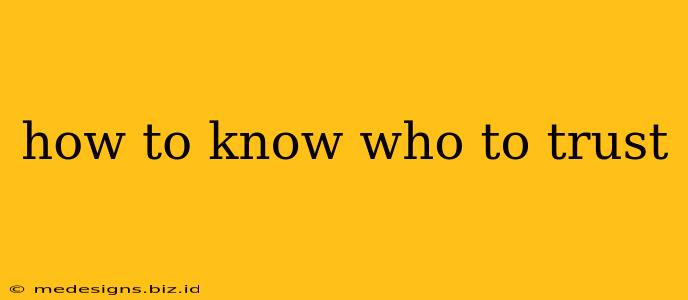Trust is the bedrock of any meaningful relationship, whether it's with friends, family, romantic partners, or even colleagues. Knowing who to trust is crucial for your emotional well-being and overall success. But in a world that often feels uncertain, how do you discern genuine trustworthiness from manipulative charm? This guide provides practical steps to help you identify trustworthy individuals and build healthy, reliable relationships.
Identifying Trustworthy Individuals: Key Characteristics
Trust isn't built overnight. It's a gradual process based on observation and interaction. Here are some key characteristics to look for in people you're considering trusting:
1. Honesty and Integrity:
- Do they keep their promises? Consistent follow-through is a strong indicator of trustworthiness.
- Are they truthful, even when it's difficult? Honesty, even when uncomfortable, demonstrates integrity.
- Do they admit when they're wrong? Accountability shows maturity and a willingness to learn.
2. Respect and Empathy:
- Do they treat you and others with respect? This includes valuing your opinions, boundaries, and feelings.
- Do they show empathy and understanding? Genuine empathy means they can understand and share your emotions.
- Do they actively listen? Paying attention to what you say and responding thoughtfully demonstrates respect and care.
3. Reliability and Consistency:
- Are they dependable? Can you count on them to be there when needed?
- Do they follow through on commitments? Consistency in actions speaks volumes.
- Are they emotionally stable? Trustworthy individuals generally possess emotional maturity and stability.
4. Transparency and Open Communication:
- Are they open and honest in their communication? They don't hide information or manipulate conversations.
- Do they encourage open communication? They create a safe space for you to express yourself freely.
- Do they respond promptly and thoughtfully to your messages? This indicates they value your communication.
5. Boundaries and Respect for Your Boundaries:
- Do they respect your personal space and boundaries? Trustworthy individuals understand the importance of personal limits.
- Do they avoid crossing lines without your consent? They are mindful of your comfort level and emotional well-being.
- Do they honor your "no"? Respecting your boundaries, even when it means sacrificing their own desires, shows true trustworthiness.
Red Flags: Signs of Untrustworthiness
While focusing on positive characteristics is important, recognizing red flags is equally crucial. Be wary of individuals who:
- Lie frequently or exaggerate.
- Break promises consistently.
- Are manipulative or controlling.
- Gossip excessively or spread rumors.
- Lack empathy or disregard your feelings.
- Are secretive or evasive.
- Frequently violate your boundaries.
- Have a history of dishonesty or betrayal.
Building Trust: A Two-Way Street
Trust is a two-way street. While identifying trustworthy individuals is important, you also need to actively cultivate trust in your relationships. Be honest, reliable, and respectful in your interactions. Open communication, empathy, and clear boundaries are essential for building strong, trusting relationships.
Remember: Trust is earned, not given. Take your time, observe carefully, and prioritize your own well-being. Don't hesitate to end relationships with individuals who consistently demonstrate untrustworthy behavior. Your peace of mind is paramount.
